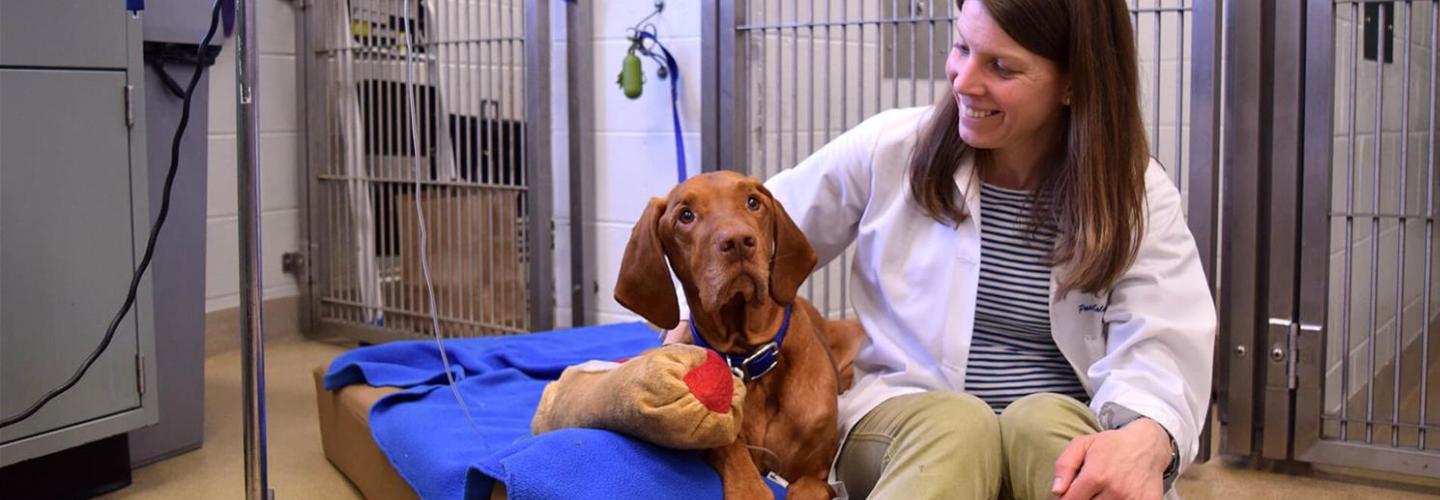
Comprehensive Cancer Care
What we do
Comprehensive Cancer Care is a cross-disciplinary approach to the diagnosis and treatment of cancer. With a core team of specialists in medical oncology, surgical oncology, radiation oncology, and interventional radiology, we provide a comprehensive assessment of each patient’s cancer care needs, and work with our pet owners and their primary veterinarians to navigate through diagnosis and subsequent treatment plan.
Our Approach
For Clients and Veterinarians
At your initial appointment, you'll meet with a member of our core team to get a sense of your pet's history, previous diagnostics and care, and the specific concerns you have.
Our Approach
For Clients and Veterinarians
At your initial appointment, you'll meet with a member of our core team to get a sense of your pet's history, previous diagnostics and care, and the specific concerns you have.
For Our Clients
We want to be sure you know what to expect and that you have the resources you need to better understand what’s going on with your pet.
What to Expect From an Appointment
If this is your first appointment, or if you are already a client, read about what you can expect and how you can prepare. You can also get your appointment-related handouts to get ready for your visit. Please contact us at 215-746-6557 or oncoschedule@vet.upenn.edu regarding appointments.
Support From Our Team
Receiving the news that your pet has cancer can raise a lot of questions about how you can manage your companion animal’s illness. Learn how to prepare for next steps in your animal’s care, and how you can take care of yourself, too.
Informational Resources
Penn Vet’s Comprehensive Cancer Care clinical team has created the following handouts for our clients. You can learn more about various cancers and available treatment options.
- Bone Tumors in Dogs
- Acanthomatous Epulides in Dogs
- Chemotherapy in Veterinary Medicine
- Renal Tumors in Dogs and Cats
- Ear Canal Tumors in Dogs and Cats
- Liver Tumors in Dogs and Cats
- Lymphoma in Dogs
- Lymphoma in Cats
- Cancer in Companion Animals
- Mammary Tumors in Dogs
- Cancer Treatment Options
- Melanoma in Dogs
- Mast Cell Tumors in Dogs
- Nasal Tumor Treatment in Dogs
- Hemangiosarcoma in Dogs
- Squamous Cell Carcinoma in Cats
- Histiocytic Sarcoma in Dogs
- Soft Tissue Sarcomas in Dogs
- Intestinal Tumors in Dogs and Cats
- Transitional Cell Carcinoma in Dogs
For Referring Veterinarians
We believe that primary care veterinarians play a vital role in the treatment process, and we strive to keep all referring veterinarians updated throughout.
If you are referring a patient to our Comprehensive Cancer Care service, please do the following:
- Read our referral page and fax us your results: 215-573-6049
About Referral Letters and Discharges
Referral letters and a copy of the discharges are sent within 24 hours of your patient’s visit, and we often reach out to you by phone following the initial consultation. Please contact us at 215-898-4805 or the appropriate service email address with any questions or concerns about a particular patient, or to discuss a referral.
About Monitoring Lab work
Many of our patients require ongoing lab work as part of their treatment plans, such as recheck nadir CBCs for chemotherapy patients. Often, owners prefer to have this lab work done closer to home for convenience. Below are some tips to facilitate lab work at your clinic in order to most efficiently provide results for owners:
The most common abnormality for chemotherapy patients is neutropenia. Patients should be started on broad-spectrum antibiotics if neutrophils are < 1000 or if the patient is febrile. Neutropenic patients who are sick may be referred to the PennVet Emergency Service for hospitalized care at any time.
- All lab work plans can be found in the last discharge, under “Recommendations and Follow up.” If you have any questions about what test to order, please do not hesitate to call us.
- CBC nadirs are most commonly drawn at 7 or 14 days after chemotherapy treatment, but this may vary by patient and the specific chemotherapy drug given.
- It is very helpful to record a TPR and weight for each patient at the time of their visit.
- Automated CBC counts are sufficient in most cases. We recommend saving a blood smear for further evaluation of cytopenias, if necessary. For patients with a history of anemia, performing a manual PCV/solids can be very helpful.
- Please fax all test results to the CCC service at 215-573-6049. It is also helpful to inform clients about the test results directly, so that they can be sure to follow up with the CCC service.
- Please note that faxes are only received Monday-Friday from 8:00 am – 5:00 pm. For patients with significant abnormalities that need immediate attention outside of these hours, especially on weekends, please call the Emergency line and ask to speak to the doctor on call.
Core Services
Our treatment strategy could involve chemotherapy, immuno-oncology, radiation therapy, surgery, interventional radiology, or a combination of the above.
We primarily treat patients with chemotherapy and other systemic medications, as well as investigational treatments through clinical trials when applicable and available.
These treatments may also be in combination with surgery and/or radiation therapy.
Our approach to dogs and cats with cancer includes a complete health assessment so that owners can make the best treatment decision for their pets.
The patient’s quality of life is paramount, and we strive to not just prolong their life through treatment but improve it, and alleviate suffering.
Penn Vet’s oncology service at Ryan Hospital is a member of the Comparative Oncology Trials Consortium (COTC) led by the National Cancer Institute. We collaborate with our human medicine counterparts to investigate new treatments through clinical trials.
Participation in these trials provides your pet with access to novel therapies, and simultaneously gathers valuable information that can help improve treatment for others.
Surgery is often the preferable option for local control of cancer. Successful removal of a localized cancer can be one of the best approaches to treat cancer patients and provide them with improved quality of life.
There are several reasons to choose a surgical approach.
To gather tissue for diagnosis.
- Surgery is used to remove tissue for biopsy, which allows diagnostic pathologists to make the most accurate diagnosis and treatment protocol.
For curative intent.
- The surgeon attempts to remove cancerous tissue or tumors with wide margins, and no cancer left behind. This approach can include other treatment options such as radiation and chemotherapy.
Cytoreductive surgery, the planned incomplete excision of a tumor, which is used when complete excision may have unacceptable consequences.
- The goal is to “downstage” the disease to microscopic level, and therefore enhance the response to other therapies.
In the instance of palliative care, the purpose of the surgery is to improve the quality of the patient’s life — though it may not extend it.
The job of our immune system is to intercept any invading pathogens or abnormal cells within the body, including cancer cells. The immune system has evolved numerous mechanisms to recognize such threats, all the while limiting the risk of autoimmunity or attack on normal cells and tissues.
But many cancer cells aren’t recognized as dangerous, and bypass the body’s natural defense system, proliferate destructively, and eventually challenge the body’s ability to function. In many cancers, malignant progression is accompanied by profound immunosuppression that interferes with effective antitumor response and tumor elimination.
Physicians and researchers in both human and veterinary medicine have developed ways to reverse this immunosuppression, or otherwise make the immune system recognize and attack the previously undetected cells. These treatments — immunotherapy and immuno-oncology — offer new ways of treating certain cancers.
Immunotherapy treatments can:
- Block the immunosuppressive properties of tumors and the associated tumor microenvironment allowing for the immune system to function properly and mount an anti-tumor response.
- Boost the body’s immune system in a general way, encouraging a more aggressive environment towards fighting cancer cells.
- Train the immune system to attack cancer cells specifically through the use of tumor vaccines or immune cell bioengineering.
Used to treat localized disease, especially when surgery or chemotherapy alone isn’t enough.
Post-Surgery Use: Often employed when tumor cells remain after surgery due to the nature of the tumor or the complexity of complete removal.
Treatment Modalities: Can be used alone or with surgery and/or chemotherapy to control or potentially cure cancer.
Symptom Relief: Even if a cure isn’t possible, radiation can significantly alleviate symptoms.
Pre-Surgery/Chemotherapy: Sometimes used to shrink tumors to a more manageable size before other treatments.
Radiation oncology plays a crucial role in managing and treating cancer, offering various approaches to improve patient outcomes.
Interventional radiology (IR) involves the use of fluoroscopy and specialized equipment to gain access to different structures in the body, and deliver materials for diagnostic and therapeutic purposes.
Our Care Team

Service head, comprehensive cancer care
Pascale Salah, DVM, DACVIM
Professor, Clinical Medical Oncology

Service head, Clinical Radiation Oncology
Lillian Duda, VMD, DACVR
Professor, Clinical Radiation Oncology
Veterinarians
Cross-Disciplinary Team
Residents and Interns

Zachary Fawver, DVM, MPH

Audrey Ghanian, VMD

Sarah Kenney, DVM

Kayla Richard, DVM

Isabel Rodriguez, VMD

Laurel Upton, DVM

Kendal Valentine, DVM

Grace Wei-Qi Woo, DVM
Courtney Briddes, CVT
Veterinary Nurse
Stephanie Corsi, CVT
Radiation Oncology Service Coordinator, Veterinary Nurse
Tonya Foster, CVT
Radiation Oncology Nurse
Jennifer Hayden, CVT
Veterinary Oncology Nurse
Patricia Knapp, CVT
Veterinary Surgical Oncology Nurse
Karen Masciangelo, RTT
Radiation oncology technician
Rachael Meyer, CVT
Veterinary Oncology Nurse
Jackie Shanley, CVT
Veterinary Oncology Nurse Coordinator
Kim Vargas, CVT
Radiation oncology Nurse
Jessica Weigand, CVT
Veterinary Oncology Nursing Supervisor
Research in Cancer Care
Faculty and clinicians at Penn Vet are actively engaged in groundbreaking research in cancer care. From developing an immunotherapeutic treatment for canine osteosarcoma to genetic rewiring, we are leaders in innovative approaches to treating cancer. Some of our faculty’s results are now being used in human clinical trials. Learn about the range of basic and translational research taking place in cancer at Penn Vet.
Cancer Immunotherapies
Penn Vet’s proximity to and collaborations with Penn Medicine continue to yield innovative ways to fight cancer. Penn Vet’s Nicola Mason, BVetMed, PhD, is working with Penn Medicine on a project to further develop cancer immunotherapies that are already showing promise in both canine and human patients. Immunotherapy describes the use of the body’s immune system to fight disease.
Molecular and Cellular Basis for Tumor Growth and Metastasis
At Penn Vet, Ellen Puré, PhD, has research that defines the mechanisms by which the local tumor microenvironment, as well as the systemic response to tumors, can either accelerate or put the brakes on cancer cell growth and metastasis. Once pathways are defined, Puré develops mechanism-based therapeutic interventions that favor inhibition of tumor growth and metastasis and promote effective anti-tumor immunity. The goal is then to turn these complexities into new treatments for preventing or treating cancer that complement current approaches used in clinical settings.
Cancer Imaging Systems
Penn Vet’s David Holt, BVSc has partnered with Penn Medicine to improve detection of surgical margins at the time of surgery to remove soft tissue sarcomas. Holt currently offers a surgery using dye and special imaging equipment to Ryan Hospital patients. This technique is vital in both veterinary and human surgical oncology to ensure that the entire tumor is resected.
Comparative Oncology Program
Penn Vet is a member of the Comparative Oncology Trials Consortium (COTC), which is run by the National Cancer Institute and provides access to a wide range of new cancer drugs in the early stages of testing. The COTC is an active network of twenty academic comparative oncology centers, centrally managed by the NIH-NCI-Center for Cancer Research’s Comparative Oncology Program, that functions to design and execute clinical trials in dogs with cancer to assess novel therapies. The goal of this effort is to answer biological questions geared to inform the development path of these agents for future use in human cancer patients.
Ryan Veterinary Hospital
Emergencies:
(215) 746-8911
By Appointment:
(215) 746-8387







